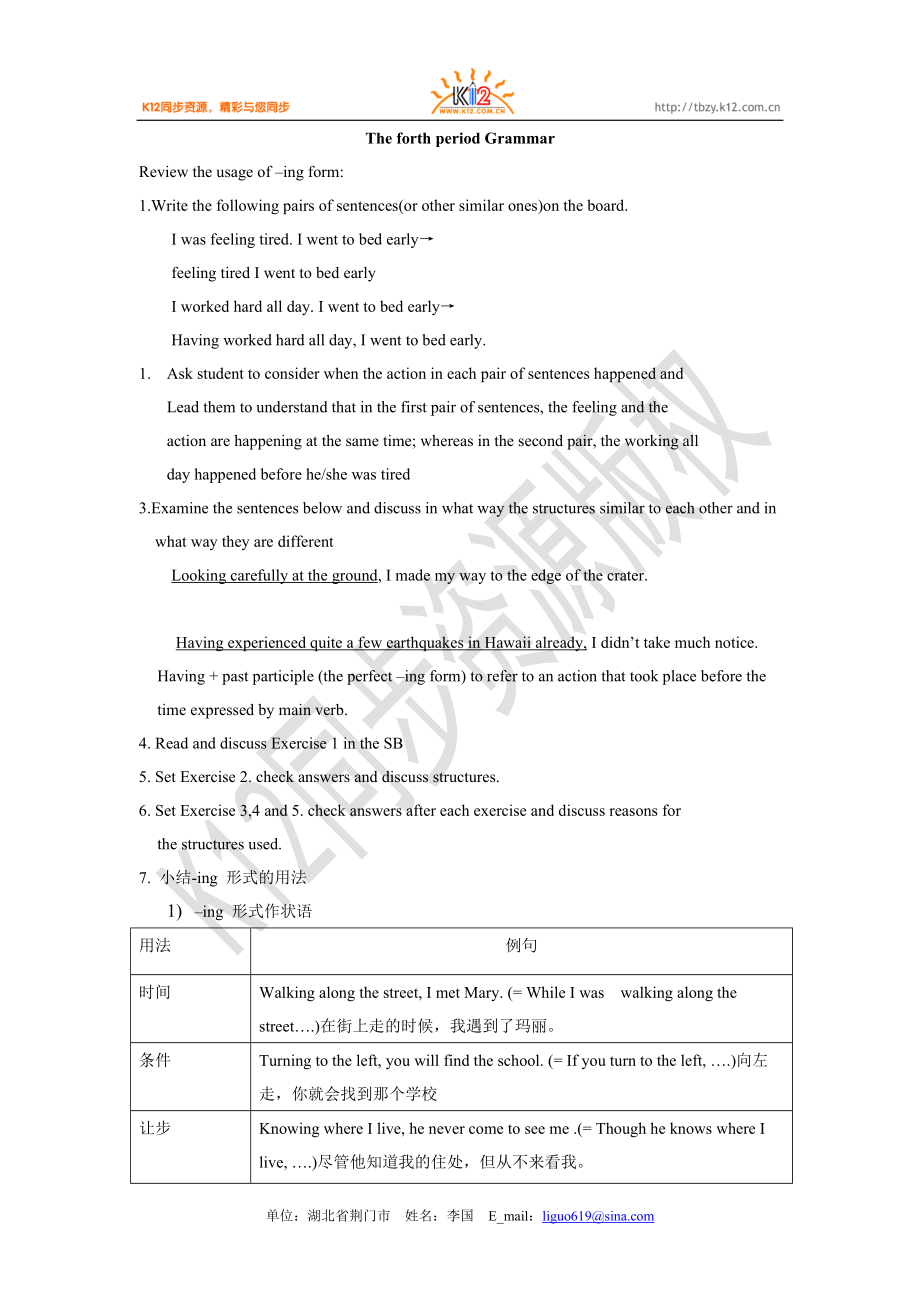《高二英語(yǔ)(選修六)unit 5 課時(shí)教案The forth period Grammar》由會(huì)員分享,可在線閱讀���,更多相關(guān)《高二英語(yǔ)(選修六)unit 5 課時(shí)教案The forth period Grammar(3頁(yè)珍藏版)》請(qǐng)?jiān)谘b配圖網(wǎng)上搜索���。
1、
The forth period Grammar
Review the usage of –ing form:
1.Write the following pairs of sentences(or other similar ones)on the board.
I was feeling tired. I went to bed early→
feeling tired I went to bed early
I worked hard all day. I went to bed early→
Having worked hard all day, I went to b
2�����、ed early.
1. Ask student to consider when the action in each pair of sentences happened and
Lead them to understand that in the first pair of sentences, the feeling and the
action are happening at the same time; whereas in the second pair, the working all
day happened before he/she was tired
3�、3.Examine the sentences below and discuss in what way the structures similar to each other and in what way they are different
Looking carefully at the ground, I made my way to the edge of the crater.
Having experienced quite a few earthquakes in Hawaii already, I didn’t take much notice.
Having
4、 + past participle (the perfect –ing form) to refer to an action that took place before the time expressed by main verb.
4. Read and discuss Exercise 1 in the SB
5. Set Exercise 2. check answers and discuss structures.
6. Set Exercise 3,4 and 5. check answers after each exercise and discuss reaso
5��、ns for
the structures used.
7. 小結(jié)-ing 形式的用法
1) –ing 形式作狀語(yǔ)
用法
例句
時(shí)間
Walking along the street, I met Mary. (= While I was walking along the street….)在街上走的時(shí)候����,我遇到了瑪麗��。
條件
Turning to the left, you will find the school. (= If you turn to the left, ….)向左走����,你就會(huì)找到那個(gè)學(xué)校
讓步
Knowing where I live, he n
6����、ever come to see me .(= Though he knows where I
live, ….)盡管他知道我的住處,但從不來(lái)看我����。
伴隨
I stood there, waiting for her. (= …, and waited for her.)我站在那兒等她
原因
Being tired , I stopped to take a rest. (= Because I was tired, ….)因?yàn)槠>耄彝O聛?lái)休息�����。
結(jié)果
It rained heavily, causing severe flooding in the area.(= It ra
7�、ined heavily so that it caused severe flooding in the area.)在這個(gè)地方雨下的如此大,以至引發(fā)了洪災(zāi)�����。
(Having been)+p.p. …, 主語(yǔ)+謂語(yǔ)
被動(dòng)
主動(dòng)
Having finished my work, I went home. (= After I had finished my work, ….)工作做完只后�����,我就回家了。
例句
u –ing形式的完成式所表示的時(shí)間在謂語(yǔ)動(dòng)詞之前
u 表示被動(dòng)可直接用過(guò)卻分詞
用法
Having +p.p. …, 主語(yǔ)+謂語(yǔ)
句型
2) –ing形式的完
8�����、成式
2) . 使用-ing形式需注意的幾個(gè)問(wèn)題:
.①分詞(短語(yǔ))作狀語(yǔ)時(shí)��,其邏輯主語(yǔ)必須與句子的主語(yǔ)一致�����。如果不一致��,必須
用獨(dú)立主格結(jié)構(gòu)來(lái)表示���,也就是在分詞前面加上它的邏輯主語(yǔ)。
My wife had a long talk with Sally, explaining why she didn’t want the
children to play together我妻子與莎莉談了很長(zhǎng)時(shí)間�����,解釋她為什么不想讓
孩子們?cè)谝黄鹜妗?現(xiàn)在分詞explaining是句子主語(yǔ)my wife做的動(dòng)作��,它
們之間是主動(dòng)關(guān)系,即expl
9�、aining的邏輯主語(yǔ)����,就是句子的主語(yǔ)my wife ����。)
The train having gone, we had to wait another day.(the train邏輯主語(yǔ) +
having gone 既為獨(dú)立主格結(jié)構(gòu))
②分詞短語(yǔ)做狀語(yǔ)時(shí),前面可以加上連詞或 介詞�����,但是分詞短語(yǔ)和句子之間不能用并列連詞(如but����,and),因?yàn)椴⒘羞B詞接的是兩個(gè)并列成分�����,而分詞短語(yǔ)只是全句的一個(gè)狀語(yǔ)部分����。分詞和主句之間可用逗號(hào)。
例如:
誤: Having been told many times���,but he still couldn’t understand it.
10��、
正: He was told many times, but he still couldn’t understand it.或
Having been told many times���, he still couldn’t understand it.
③-ing的一般式和完成式現(xiàn)在分詞都可以表示先后接連發(fā)生的動(dòng)作�����。在可能引起誤解的場(chǎng)合應(yīng)該用完成式現(xiàn)在分詞表示先發(fā)生的動(dòng)作�����。
例如:
Opening the drawer,he took out his wallet. (=He opened the drawer and took
out his wallet.)他打開(kāi)抽屜��,拿出錢(qián)
11�、包。
Coming into the room��,he put down his bag. (=he came into the room and put
down his bag.)他走進(jìn)房間�����,放下提包����。
Having brushed his teeth�����,Mr. Brown came downstairs for breakfast.
布朗先生刷過(guò)牙����,就下樓來(lái)吃早飯����。 (此句如寫(xiě)成:Brushing his teeth,
Mr. Brown came downstairs for breakfast.可能指“邊刷牙,邊下樓’�。
④分詞的否定形式是在分詞短語(yǔ)前面加上 not, never等否定詞構(gòu)成。
例如:
Not fearing the fire, the child touched and got a finger burnt.
小孩兒不知道怕火����,用手去摸,把手指燙了��。
Not knowing how to find the subway, I asked a policeman for help. 我不知道怎
樣找到地鐵���,就去找警察幫忙��。
單位:湖北省荊門(mén)市 姓名:李國(guó) E_mail:liguo619@
 高二英語(yǔ)(選修六)unit 5 課時(shí)教案The forth period Grammar
高二英語(yǔ)(選修六)unit 5 課時(shí)教案The forth period Grammar

